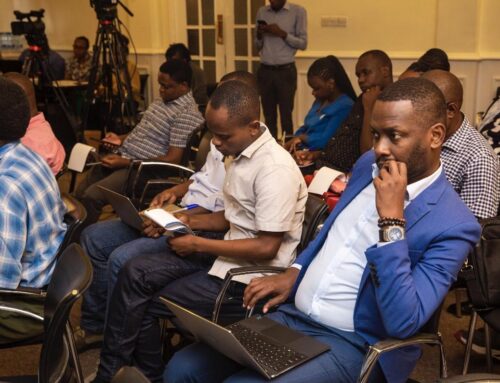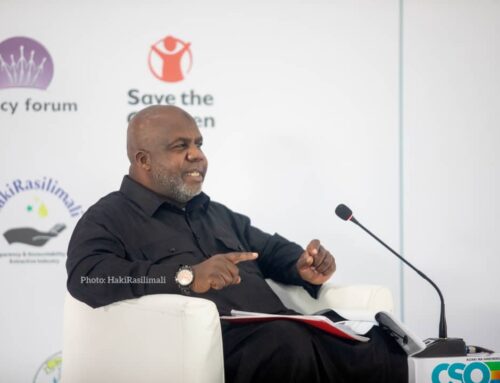The United Republic of Tanzania (URT) , being part of the global village, has not been spared from
the effects of this pandemic. As of 6th April 2020, there were reported twenty (24) cumulative
cases of COVID-19 infections in the country with two recovery cases and one reported death.1
Hundreds of people from both Tanzania Mainland and Zanzibar are currently under medical
surveillance at various designated confinements centers. The rest of East African (EAC) countries
have also recorded a number of cases of infections in their countries in which, Kenya leads with
142 cases, followed by Rwanda 89 cases, Uganda 48 cases and Burundi with least reported
cases (only 3).
The interaction of people within the EAC and SADC Blocks and continuous influx of visitors
from other nations could pose eminent threats of the spread of infections. This is particularly
a case because Tanzania, has not yet imposed a ban on in-coming of international flights, ships,
train and vehicles. However, there are quite remarkable efforts made by the government
to ‘control’ and ‘contain’ the spread of infections such as imposing a mandatory 14 days
quarantine to all visitors and incoming Tanzania citizens and many more as explained in
this paper. In the wake of this pressure for urgent, collective and aggressive actions against
the COVID-19, the role of CSOs becomes imperative and more pronounced for three
justifications: –
- An outbreak of the viral disease COVID-19 is socio-economic issue falling within the
realm of CSOs’ interventions. Health rights, education, accountability and other issues
are inherited responsibilities and core functions of most of CSOs in Tanzania. - The actions to control and contain an outbreak of the viral disease COVID-19 are public
concerns, human rights and governance issues that require an effective inclusion and
participation of all the people. This is in accordance with Articles 8 and 9 of the Constitution
of the United Republic of Tanzania of 1977. - An outbreak of the viral disease COVID-19 significantly demand for a lot of public financing,
a situation which would cause overwhelming of health and other related facilities. Being an
emergency and multispectral pandemic, the government machineries will definitely require
other actors to supplement its efforts. The civil society sector (CSS/ CSOs) have long and
impeccable goodwill in this regard
The CSOs of Tanzania recognize, appreciate and applaud the Government of Tanzania, other
State machineries and non-state actors for anti-COVID 19 initiatives that have been taken so
far.. In addition to those initiatives, CSOs are of the views that, much more efforts or rather
innovative measures are needed to scale up the control and preventive processes of COVID-19
outbreak, current negative impacts and the aftermath of the same should be contained in a near
future.
This paper analyses effects and proposed possible mitigation strategies for all key sectors
(informal sector, education, health, trade, agriculture, pastoralism, fishery, extractive industry
and economy generally); and, gender groups (women, indigenous, remandees, prisoners, youth,
children, refugees, people living with HIV, persons with disabilities, and elderly)
Basing on the inherent and core functions of CSOs, the broad strategic areas which CSOs seek
to engage with the government are:
- Advocacy which include community mobilization, system or policy reforms, public
awareness and sensitization on effective prevention and control measures of the
pandemic. - Service provisions (monetary and non-monetary ones such as provision of legal aid,
psychosocial, researches and impact assessments). - Impact assessment and mitigation strategies on negative impacts of current and potential
measures against COVIC-19.
Chapter Two and Four of this paper present some notable challenges, potential negative impacts,
untapped opportunities, actions plans as well as recommendations on a set of measures that
will enable the government and other stakeholders including local CSOs to handle COVID-19
outbreak especially when such measures involves vulnerable groups. It is a good move that the
Ministry of Health has staged up some joints initiative, involving State and Non-state actors.
However, there are some concerns from local CSOs that, these initiatives do not offer effective
enough room for inclusion and participation of local partners apart from international and UN
based stakeholders/NGOs.
The local CSOs are of the view that, their wider inclusion into various coordination mechanisms
will add impetus especially because they have clear and wide understanding of the local context
down to the grassroots levels. An effective engagement of local CSOs is also for sustainability
of the processes and results. It should also be noted that, this paper is read together with CSOs’
Proposed Action Plan (attached separately), which elaborate further the strategies reflected in
this part of the paper.
This paper has a special focus on current negative impacts and the aftermath of the COVID-19.
For instance, there are issues associated with social-healing including public awareness and
sensitization on stigma, domestic violence, fear, anxiety and discrimination as well as loss of
economic opportunities and means of survival due to some limitations of economic engagements.
The local CSOs community could do all these better because of their wide network (broader
outreach) down to the grassroots levels.
Moreover, this paper also assesses the adverse effects of this pandemic to the work of CSOs
in Tanzania. Chapter three of the paper covers this analysis. On this, the paper suggests some
avenues in which government and local CSOs can productively work together to defeat this and
similar pandemics. As of 2020 Tanzania had about 40,000 CSOs (of different types mentioned
earlier) operating on the mainland and in Zanzibar according to a set of laws governing the sector
in the two sides of URT.
COVID-19 being an emergence outbreak, caught CSOs by surprise and therefore unprepared
to respond to it promptly. This also needs an earnest attention from different actors for the
survival of this (CSS) sector at large. The CSOs’ risk analysis did not look at a highly contagious
global outbreak in relation to possibility of spreading to Tanzania. Therefore, CSOs did not have
contingency plan to ensure continuity of their operations.
Finally, the government should adopt a joint anti-COVID 19 intervention strategies with large
community of local CSOs spreading all over the country. A total of 75 (being 40%) of 182
CSOs participated in the online survey on control and prevention measures against COVID-19
proposed that CSOs in collaboration with Development Partners should come up with a joint
plan on this pandemic. Some of the issues to be addressed in the joint plan were mentioned to be
joint resource mobilization, awareness raising and mitigation of negative impacts.
The CSOs anticipate that, the coordination mechanisms by the government under the Ministry
of Health and Prime Minister’s Office will be reformed to holistically accommodate wider
community of CSOs and other actors. This is due to the fact that, the control and prevention of
this pandemic is multidimensional and that, there is a possibility of overwhelming government’s
coordination capacities if it has to do ‘everything’ alone. There are also some recommendations
on modus operand of the approach taken so far; inputs to the national contingency and other
plans; and, fiscal policy and legal reforms. A brief analysis on the Disaster Management Act of
2015 (Act No. 7/2015) has been reflected in this paper. The CSOs will come out with deeper
policy and legal analysis on disaster management in a near future. Read more CSOs Position Paper on COVID19 -FINAL





